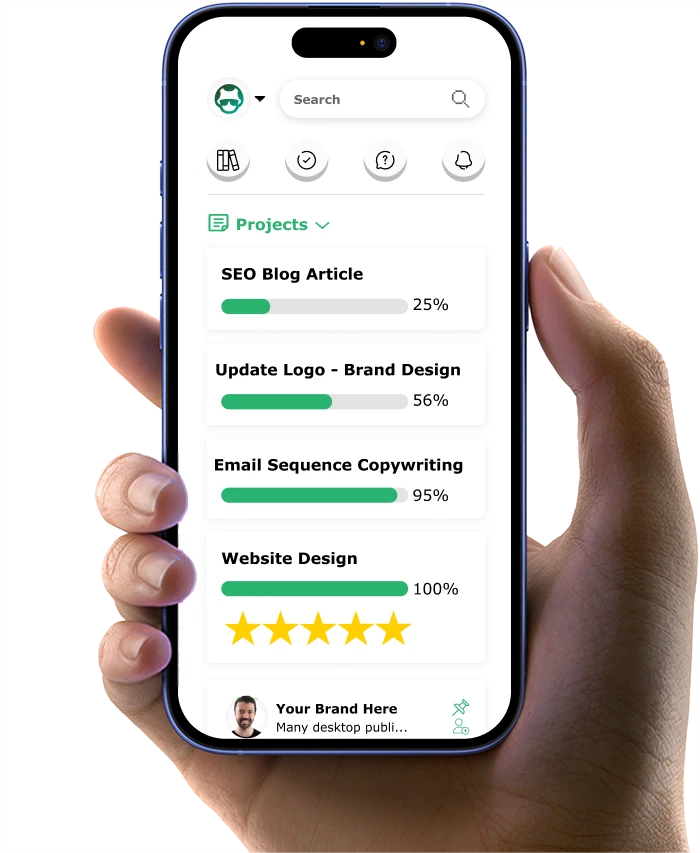Authentic Marketing: The Little-Known Way to Grow a Business & Get Noticed
 I was 19 when I first fell in love with entrepreneurship and the idea building a successful company.
I was 19 when I first fell in love with entrepreneurship and the idea building a successful company.
It grew out of the idea that the experience would be filled with adventure, and that I could become wealthy while also being an artist.
As I got older, and once I got beyond the misguided hype about building a startup fast and lean and then flipping it for millions, what filled that space was the desire to build a company that matters.
I wanted to build a business that would exist for the ages and do meaningful work based on a set of core principles, not a hollow vessel leading me to an early retirement filled with speeches and beaches.
But this article is not about me, or Growbo. Rather this article to be about you and how you can build a better business that gets people's attention for the right reasons.
What is authentic marketing?
A couple of years ago I wrote an article on this topic for Forbes. The reason I'm revisiting it here is I believe it deserves more attention than the ~600 words I was allowed to write at the time. Moreover, I believe authentic marketing is a highly underrated strategy for differentiating any business.
Authentic marketing is the strategically unstrategic way of saying or showing what you believe in order to grow a business. In other words, a company that practices authentic marketing says what it means and, more importantly, backs it up with action.
By practicing it, it leads to fans, followers, and customers who were more inclined to buy from you, in part, because they agree with what you stand for.
The reason why it is "strategically unstrategic" is because, strategically, you want to market your business in order to grow but that's not why your company expresses what it believes. You say what you believe because you believe it and, yes, if it leads to more customers who agree with you then that's just a nice bonus.
Authentic voice and your company's reason for being are echoed in almost everything that you do as a business. For instance:
- Follow-up emails to recent customers
- Phone calls
- Webinars
- Speeches
- Blog posts
- Website salescopy
- Even landing pages
At all touch points with your business you have an opportunity to express, in subtle and overt ways, how you're unique and what your company stands for.
"Does authentic marketing mean I should give my political views?"
As a rule of thumb, stay away from politics. As Jack Ma, billionaire and the founder of Alibaba recently wrote, politics and and business are like oil and water. They don't mix well.
More over, unless you're a sole proprietorship (freelancer / consultant), the authenticity I'm talking about here should flow from your team's core beliefs about why they do the work they do.
4 successful examples (and 1 failure) of authentic marketing in action
There's no better was to understand a concept like authentic marketing than by showing lot of examples, so let's dig in.
Zappos has a reputation for putting customer service ahead of profits. It has demonstrated this multiple times.
The most striking and memorable example is that of a woman who purchased boots as a gift for her husband. Unfortunately he never received them because he was killed in a tragic car crash on his way home from work.
When the woman called to inquire about the company's return policy explaining what had happened, the customer service representative at Zappos ordered flowers to be sent to her in condolence for her loss.
Touched by the gesture, the woman later shared the story with friends and family at her husband's funeral.
37Signals is a web company started over 15 years ago, originally as a web design agency. Over time they've gained a reputation as thought leaders around web marketing, web app development, and more recently, productivity (with their book Rework).
In February of this year, they made the surprising announcement that they would be completely rebranding their business as simply, Basecamp, after the name of their most popular web product for project management.
However, for anyone who has been following their business for more than a few years, this is less surprising considering past moves like their decision to completely stop developing and marketing their Backpack product.
Similarly, the founders have regularly, in their interviews and books, preached a philosophy of minimalism in product design, focusing on learning from successes rather than from failures, and sustainable work practices (like working only 6-8 hours a day and then stopping).
This most recent decision to rebrand is perfectly in line with their previous expressed ideas and actions.
Apple and the legacy of Steve Jobs' needs no introduction. Steve's aggressive, detail-obsessed product design philosophy is encoded into the DNA of Apple.
And rather than me write another word explaining it, you can get a first hand sense by listening to Jony Ive, VP of Apple design, in the short video about the iPhone 5c below.
"We believe the iPhone is an experience, an experience defined by hardware and software working harmoniously together."
https://www.youtube.com/watch?v=utUPth77L_o
Here's a lessor known example. Tabasco sauce is a worldwide dinner table staple for anyone who wants to give their food a bit more "kick" or flavor.
The business is private and has been family owned since it was started just under 150 years ago shortly after the conclusion of the American Civil War. Revenues are estimated at over $200 million annually but no one knows for sure.
I noticed them as a shining example of authenticity in marketing after a recent 60 Minutes interview where the current president of the business talked about their simple process and how they ensure consistent quality.
For instance, he demonstrated how each day hand-inspects every barrel of mashed peppers.
In addition, according the company's director of operations, the man next in line to take over as president, the company doesn't believe in using automated machines to reduce labor costs and speed up their pepper-picking process. They prefer to do it by hand because they believe it would diminish the quality of the product, as he demonstrated in the interview.
"We don't want to change the plant... Every time you breed something you give away something, and taste is always the first thing that gets cast away."
Last, here's an example of an authentic marketing fail.
I'll preface by saying that I don't think the company and the person named in this example are in any way bad, and this is not an attempt to call anyone out or "hate." But for anyone so listens to the interview I reference here, you'll understand first-hand why this is a failure.
Part of my motivation to write this article came earlier this week when I listened to a Mixergy interview with Joshua Reeves the co-founder and CEO of ZenPayroll.com, a new payroll software company.
The first part of the interview was interesting. The listener learns a bit about Josh's previous company and about the deep-seeded beliefs around which ZenPayroll, his current business.
But after that point, the interview gets frustrating for the listener because--despite Andrew Warner's (the interviewer) best efforts to extract a single concrete story or specific examples of their philosophy in action--the discussion remained hollow, high-level, and vague.
Josh, the interviewee, kept repeating the same tired lines about what the company believes to the point where I as the listener didn't believe it.
In the end, the reason why opportunities to tell the story of your business end up backfiring is there may be a perfectionist desire at work, and an underlying need to protect oneself from the risk of looking foolish or saying something wrong.
Ultimately, this type of incident hurts the business and frustrates the audience.
Learning from this example, the key to authentic marketing having a willingness to show your true self, even if involves recounting past mistakes or in saying something disagreeable.
How authentic marketing gives you a competitive advantage
When someone says the word "branding" it might often be a code-word for "BS." At least, according to one blogger.
Yes branding is difficult to measure, but it does exist and can be observed through qualitative feedback and the content of what someone tells his or her friends about your company.
Positive brand building is one of the long term outcomes of being "real" and true in your marketing messages.
I credit this to the concept of "emotional linking" which explains the different levels on which someone relates to your business.
The idea is that by building up positive associations with a brand over time, this leads to higher level of consumer loyalty and an increased willingness to recommend that company to others.
The short term advantage of authentic marketing is that it makes your company more
- memorable (most company's work hard to appear "corporate" out of fear that people will think they are "small")
- approachable (prospective customers will be more open to contacting you or buying from you knowing that there are real people who stand for something behind the product)
For example, I've personally seen a number of instances of this since I started writing articles earlier this year.
Readers are more open to reaching out: asking questions, leaving comments, making referrals, or inquiring about our web marketing services.
How do you get started?
You hopefully understand what authentic marketing means at this point, but how do you actually do it?
Simon Senik, in his now famous speak at TED speech from 2009, explained that what you do serves as proof of what you believe. Moreover, what makes extraordinary companies like Apple consistently innovative and successful is that they "start with why."
Step 1 - Begin With Why

Step back for a moment and ask yourself some questions:
- Why did I start this company? What was my original inspiration?
- Has that initial reason changed? If so, why and what is the reason now?
- Why does it matter that my company provides this product or service?
- What impact do I want my business to have on the world, or on my community?
It may sound strange, but don't be afraid to be selfish in your answers. Many times, that's the most honest way to understand why you're actually doing something.
For example, I started my company for completely selfish reasons. Sure making money was one reason, but not the main.
You see, I was always trying to create stuff growing up (drawing, painting, writing, programming).
But I rarely finished my projects simply because getting something to completion meant investing more time and resources than I was willing to give--and I had so many other "great" ideas.
Growbo grew out of that relentless childhood desire to create--I wanted something that could make my creative ideas real faster. So, in forming Growbo, I saw this could be accomplished through a combination of software, people, and process.
Today the company provides web marketing and design services to other businesses, yet my team and I see this as a branch of a much larger tree that's growing over time.
Step 2 - Take a Look Around
The next step is to look at how you're going fulfill your "why" as a business.
- How will our team interact with customers? What will they do or not do that's unique?
- What should our logo and other graphical elements communicate about our business?
- How do you adjust your internal processes to reflect who you are and your reason for existing as a business?
Details matter. The product or "commodity" that you provide (e.g. website design, coaching, reading software, etc.) just happens to be an extension of the why and how in your company.
For instance, Zappos sells shoes, but they exist to provide amazing customer support. Here's the mission statement from their website:
"We've aligned the entire organization around one mission: to provide the best customer service possible. Internally, we call this our WOW philosophy."
Does that mention anything about shoes?
Step 3 - Cleaning House, Making Changes
This the most difficult part because it requires you to take action and repeatedly draw a line in the sand.
Once you understand why your business exists, what you value, and how you intend to service customers and conduct your business, your next step is to go ahead and implement the changes.
This is scary because it means that you're willing to risk temporary failure and pushback from customers and your team members. But if you've taken the time to explain why and hear disssenting views, anyone not on board after that point needs to be taken off the team or certain customer relationships need to come to an end.
That's a tall order, to risk losing talented people and some revenue, but if you do it right others will take notice and the indirect benefits will win-out over time.
The risks involved, and a word of caution
Before you get too excited about the concept of marketing simply by expressing what you personally believe you should understand the risks involved here.
First, authenticity is not a requirement for running a successful business.
Sometimes, we think it should be, like when we're dealing with some of the robotic customer support staffs at large companies (cough--Time Warner Cable--cough, cough).
Second, the biggest risk you'll face in taking an authentic marketing approach is that over time, if it's successful for you, it will be challenged as I mentioned earlier. That's something you have to be prepared for because it will be challenged by competitors, by customers, and by unforeseen circumstances, like an economic collapse.
If your company fails to stick to what it believes at those times and compromises, then your brand will be punished because people will no longer see you as "real" and rather as just another brand pay lip-service to "nice ideas."
To paraphrase some of Jim Collins' research, the biggest test of a company's beliefs are not whether they stick to them in good times, but whether they refuse to compromise on them even when they prove to be a disadvantage.
Finally, a word of caution as this strategy relates to living in the real world.
Imagine yourself at a professional networking event and someone comes over to speak with you.
You tell him who you are and what you do, and then it's his turn to do the same. Except, he's taken the concept of authentic marketing a little too much to heart and gives you his life story on why he believes all car tires are improperly designed, his company's mission and core values, and continues to write you a "verbal essay" full of his glorious philosophy...
Meanwhile, even though what the tire concept he's working on might be of interest to you, all you can think about is getting away from this guy because for all his "authenticity," he's completely self-centered and has completely ignored you, the person he wanted to have a conversation with!
The point here is if you want to build a great business on a set of key principles with a real human voice, you can do it, just don't forget the needs of your audience and the fact that "authenticity" doesn't automatically mean that it's all about "you" from now on.
Conclusion
Here are the key points that I hope you'll take to heart from this article.
- If you're an entrepreneur just starting out, don't fall into the hype mentality thinking that business is simply "get in, get out, get rich." Don't build a startup, build a real business.
- Authentic marketing is the key differentiator between great companies that people love, remember, and respect--and good companies, who exist simply to provide a service or product.
- Authentic marketing is a "strategically unstrategic" choice because it can't be faked or done for the long-term bottom-line benefits. People will find out the truth. In addition, it's a wholly inconvenient choice since you'll be constantly challenged and tested by outside forces.
- As Simon Senik says, "People don't by what you do they buy why you do it, and what you do serves as the proof of what you believe."
- The basic steps to implementing an authentic marketing strategy in your business are to (1) look inside, and ask why, (2) look outside at your business today, and (3) take action to reconfigure those parts of your business that don't fit with your why and how.
My goal in writing this article is to challenge the common (often unrealistic) reasons for starting a business and a desire to help current entrepreneurs build better, more meaningful companies.
Last, here are some parting words from Seth Godin, without which this article would be incomplete:
"That's your opportunity, to say what you believe and see who follows."

So, what's YOUR why?
Image Credits:http://marshilltop.blogspot.com/2012/01/authentic-leadership.htmlhttp://gizmorati.com/2013/01/08/5-online-college-classes-to-consider-taking/http://findfulfillflourish.wordpress.com/2010/12/22/the-great-debate-and-balancing-act-short-vs-medium-vs-long-term-needs/

























